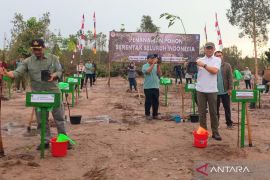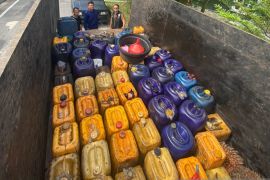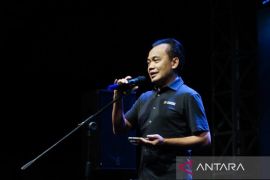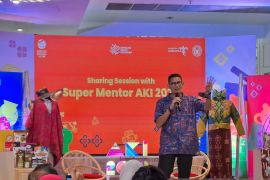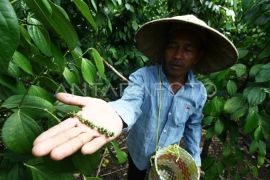Almost all of the province`s coastal waters are good for seaweed cultivation because they are mostly calm and have a relatively low mud sediment.
"The calm sea condition and relatively little mud sediment ensure a high seaweed survival rate because the water can then be penetrated by the sunlight that accelerates the growth of the seaweed," Babel`s marine and fisheries office spokesman Fhores Fherado said in the provincial city of Pangkalpinang on Thursday.
Fhofres said Babel province has set itself the target to cultivate one million tons of seaweed up to 2015 in the region`s coastal waters.
According to him, seaweed had a high economic value and if cultivated on a large scale it would improve the welfare of the fishermen`s community in the province.
"We have so far cultivated around 25,000 tons of seaweed in the provincial waters but we have a target to increase it to one million tons by 2015," Fhores Fherado said.
He said a number of areas in the province had grown and developed seaweed with a quite satisfactory result of about 670 tons because the orientation was just limited to seedling nursing and planting.
Fhores explained that seaweed in Babel province can be harvested in 45 days on average, and technically it was not difficult to grow the marine crop.
To achieve the target of one million tons of seaweed in Babel waters, Fhores said groups of fishermen in every region of the province had been empowered by giving them guidance on how to grow seaweed commercially.
He said seaweed could be harvested three times a year with a net yield of Rp7 million to Rp10 million per hectare, or Rp25,000 to Rp50,000 per kilogram.
"Therefore, we will continue to develop seaweed cultivation in Babel province because it has high economic value for the welfare of coastal area dwellers," Fhores said, adding it was technically not difficult to grow seaweed.
Babel Governor Eko Maulana Ali once said in Pangkalpinang in October last year that the province had abundant marine resources of seaweed, shrimps, lobsters, squids, flying fish, and many others which were waiting to be developed by domestic and foreign investors.
He said Babel province had also plenty of mining and mineral deposits such as quartz sand, building construction sand, kaolin, granite, aside from tin.
No wonder investors from Vietnam in October 2010 explored a location in Bangka
Selatan district to invest in the fisheries sector.
"The investors from Vietnam intended to invest in the fishery sector and have visited Bangka Selatan district to obtain first hand information about suitable locations for their investment," Babel Governor Eko Maulana Ali said here on Thursday.
He said the investors had visited several locations, among others the Sadai area in Bangka Selatan where they would like to invest in the fisheries sector.
In addition, Bangka district head Yusroni Yazid said recently that the local administration would continue to offer maritime and fishery sector to both private parties and foreign investors to invest in a bid to improve the local people`s welfare.
"The opportunity for private parties and foreign investors to invest in maritime and fishery sector is still wide open because Bangka district has abundant business potential that has yet to be developed optimally," Yusroni said.
According to him, investment of maritime and fishery sector in Bangka would have a positive impact on the local people, especially the local fishermen`s economic growth.
"I believe that if the maritime and fishery sector in Bangka island is managed properly and optimally, it will help improve the local people`s welfare and economy," Yusroni said.
He made such a statement because the central and regional governments were at present intensively developing maritime and fishery sector across the country.
"The investors can invest in fisheries product processing and fishing sectors," he said.
According to him those two sectors were interrelated because fishing results could be processed into various kinds of healthful food commodity.
"We can prove that maritime and fishery sector in Babel province is still promising and potential to be developed," Yusroni said.
So long as seaweed is concerned, Soenan H Poernomo, the head of the Marine and Fisheries Ministry`s Data, Statistics and Information Center in Jakarta said in November last year that the Korean Institute of Technology (Kitech) had expressed interest in cooperating with Indonesia in cultivating seaweed as a biofuel in Bangka-Belitung and West Sulawesi.
"So far seaweed is mainly being used as a raw material to make certain foods and cosmetics," he said.
The government was optimistic that Indonesia`s seaweed production would increase from 2.6 million tons in 2010 to 10 million tons in 2014.
Since the commodity can be easily produced on a massive scale in the country, Soenan said Indonesia should develop and use seaweed as a biofuel.
"Indonesia should adopt a strategy to develop its seaweed industry to produce biofuel and eventually make it its main fuel," he said.
According to him seaweed must be developed to become the country`s main fuel because fossil fuel reserves were to deplete while solar energy would become unreliable because, as a consequence of climate change, tropical countries would have much rain (blocking sunshine).
Moreover, biofuel from plants would compete with food security programs and land on which to grow the plants would be increasingly occupied by human settlements.
"Indonesia is the world`s largest archipelagic country and has the longest coastline in the world," Soenan said.
He said, in the matter of designing an energy development strategy, Indonesia could learn from South Korea which was anticipating the depletion of fossil fuels, by developing seaweed as biofuel for the future.(*)
Reporter: Otniel Tamindael
Editor: Jafar M Sidik
Copyright © ANTARA 2011
